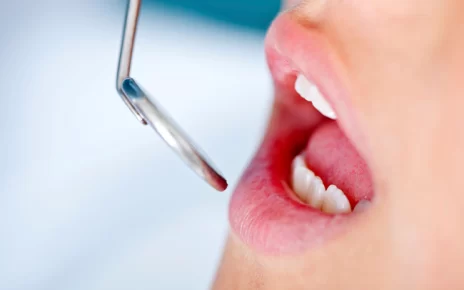So, you’ve embraced the plant-powered life. Your body and the planet are thanking you. But what about your teeth? Honestly, it’s a question that doesn’t always pop up first. A well-planned plant-based diet can be fantastic for your overall health, and by extension, your oral health. But, if you’re not careful, it can also present some unique challenges for your pearly whites.
Think of your mouth not as a separate entity, but as the front door to your body’s health. What you eat doesn’t just affect your gut; it sets the stage for everything happening in there—the bacterial balance, the enamel strength, the gum vitality. Let’s dive into what you need to know to keep that smile bright and healthy while thriving on plants.
The Bright Side: How Plant-Based Diets Can Boost Oral Health
First, the good news—and there’s plenty of it. A whole-food, plant-based diet is naturally rich in foods that act like little toothbrushes. Crunchy vegetables like carrots, celery, and apples require a good amount of chewing. This mechanical action helps scrub away plaque and stimulates saliva production, which is your mouth’s natural defense system against cavities.
Furthermore, these diets are often lower in fermentable carbohydrates—the kind of sugars that cavity-causing bacteria absolutely love to feast on. By cutting down on processed sugars and acidic animal products, you’re essentially evicting the bad tenants from your oral microbiome.
Navigating the Potential Pitfalls: Nutrients to Watch
Here’s the deal, though. Any restrictive diet, even a healthy one, requires a bit of strategy. When you eliminate animal products, you need to be intentional about replacing the key nutrients that support a resilient smile.
Calcium: The Building Block Everyone Thinks Of
Sure, you know calcium is crucial for strong teeth. But without dairy, where do you get it? Well, you’ve got options. Fortified plant milks and yogurts are an easy win. But don’t overlook the power of leafy greens.
- Fortified Foods: Plant milks (almond, soy, oat), tofu made with calcium sulfate, and some orange juices.
- Leafy Greens: Collard greens, kale, and bok choy are surprisingly packed with bioavailable calcium.
- Other Stars: Tahini (sesame seed paste), almonds, and figs.
Vitamin D: The Unsung Hero for Absorption
Here’s a thing a lot of people miss. You can consume all the calcium in the world, but without sufficient Vitamin D, your body struggles to absorb it properly. This vitamin acts like the key that unlocks the door for calcium to strengthen your bones and teeth.
Sunlight is the best source, but for many, especially in northern climates, it’s not enough. Look for fortified foods or, honestly, consider a supplement. It’s one of the most common deficiencies across all diets, plant-based or not.
Phosphorus and Vitamin K2: The Behind-the-Scenes Crew
Phosphorus works hand-in-hand with calcium to build strong tooth enamel. Luckily, it’s abundant in plant foods like lentils, pumpkin seeds, and whole grains. Vitamin K2 is a bit trickier. It’s the traffic director, telling calcium where to go in the body (like your teeth, not your arteries). Fermented foods like natto are the best plant source, but it can be an acquired taste. Some plant-based supplements now include K2 derived from fermented chickpeas.
The Acid Test: Dealing with Erosion from Plant Foods
This is a big one. Many healthy plant foods are naturally acidic. Citrus fruits, tomatoes, berries, even that healthy splash of apple cider vinegar in your dressing—they can all contribute to enamel erosion over time.
Now, I’m not saying to avoid them. That would be silly. They’re packed with vitamins and antioxidants. The trick is in the how.
- Don’t Sip All Day: Drinking lemon water or smoothies slowly over hours is a constant acid bath for your teeth.
- Rinse with Water: After eating something acidic, swish with plain water to neutralize the pH.
- Timing is Everything: Wait at least 30 minutes before brushing your teeth after consuming acidic foods or drinks. Your enamel is softened and brushing right away can actually wear it down faster.
Putting It All Together: A Day of Plant-Based Eating for Dental Health
| Meal | Food Idea | Dental Benefit |
|---|---|---|
| Breakfast | Oatmeal made with fortified soy milk, topped with almonds and chia seeds. | Calcium from milk, scrubbing action from almonds, phosphorus from seeds. |
| Lunch | Large salad with mixed greens, chickpeas, tahini dressing, and a whole-grain roll. | Leafy greens for calcium, chewing action for saliva, whole grains for phosphorus. |
| Snack | An apple and a handful of pumpkin seeds. | Natural scrubbing from the apple, phosphorus from the seeds. |
| Dinner | Lentil curry with fortified tofu and steamed broccoli. | Protein and phosphorus from lentils, calcium from tofu and broccoli. |
Beyond Food: Your Non-Negotiable Oral Care Routine
No diet, no matter how perfect, replaces a solid oral hygiene habit. In fact, it becomes even more critical. Use a fluoride toothpaste—it’s your number one defense against cavities, remineralizing enamel in a way no natural toothpaste can. Floss daily to prevent gum disease, and see your dentist for regular check-ups. Be sure to tell them about your diet; it helps them provide the best, most personalized care for you.
Ultimately, thriving on a plant-based diet while maintaining excellent oral health is completely achievable. It just asks for a little more awareness. It’s about seeing your food not just as fuel, but as part of a broader ecosystem that includes the very first step of digestion—your smile. A little strategy goes a long, long way.





